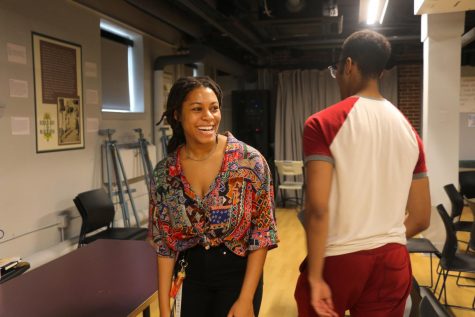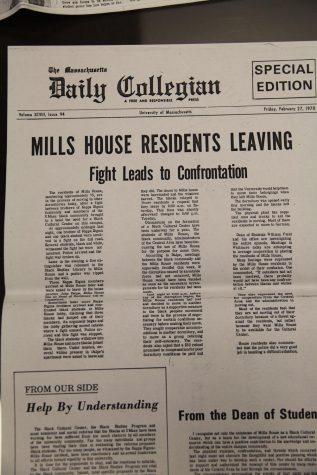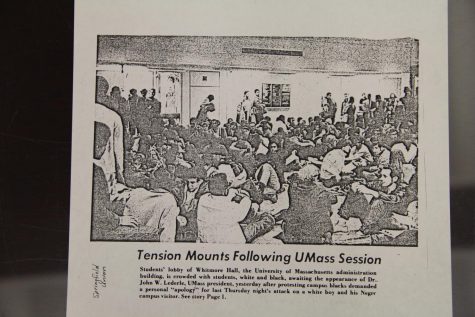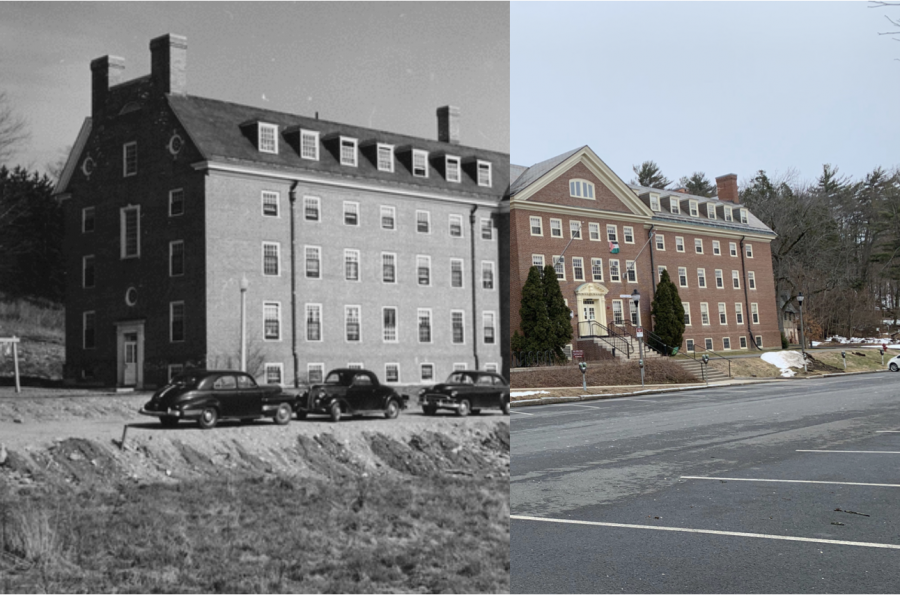Massachusetts Historical Commission, UMass Amherst
The New Africa House: yesterday, today and tomorrow
50 years of creating space for Black community
February 28, 2021
February 7, 2020
On a cold February evening last winter, University of Massachusetts students piled into the basement of the New Africa House for an event called The Cyph.
“A creative series where artists of the African Diaspora come together to share our work and our joy with our community. Mics, music and magic,” event coordinator and African American studies major Carolyn Parker-Fairbain advertised.
She was inspired to create the event because, growing up in Boston where cyphers occurred regularly, she was surrounded by a rich culture. “When I came here, I felt like that was lacking.”
Parker-Fairbain also identified a disconnect on campus, where students went to Southwest Residential Area or to the Fine Arts Center for student life and culture. She wanted to create another space for community in the center of campus.
One night, Parker-Fairbain said she was “fed up” and sent Dr. Stephanie Shonekan, former head of the W.E.B. Du Bois Department of African American Studies, an email at 3 a.m. asking to do something called, “The Cyph.”

The event would be funded by the African American Studies Department and coordinated among the Afro-Am Undergraduate Council. But all Black artists of any major were made welcome to come or perform.
“I definitely want all Black people on campus to be able to engage with like The Cyph. That includes people with disabilities, queer people. Everybody who is Black should feel comfortable in the space,” she said.
When the night of The Cyph rolled around, Parker-Fairbain said that there were more people there then she could have ever anticipated.
“There weren’t enough seats for people. People were standing up everywhere. People were sitting on the floor, sitting in the corner,” Parker-Fairbain said.
When students walked into the basement of the New Africa House that night, they saw easels, provided by the studio arts department, covered in art. UMass student, Martha Zziwa shared two paintings: one of three young Black girls with crowns and a portrait. Visual art was also hanging from the ceiling.
A table covered in work by art major Beatrice Waithaka sat next to the tech table. A small metal stage surrounded by chairs sat in the center of the room.
Before the event began, organizers gathered in a community circle to set goals and intentions for the night. Parker-Fairbain said that the The Cyph was meant to be intentional and push for liberation.
“It’s not just a talent show. It’s about creating a community. You have to know who’s on stage with you and you have to know who’s creating these things with you,” Parker-Fairbain said.
During the event, artists performed poetry and music.
“When creating a Black space, there’s a lot of things that could potentially come in the door with you and so being able to create a space that is brave enough for us to be able to speak truth to power and be able to hold each other up and hold each other accountable and call each other in and making that something that’s a part of the experience that has been acknowledged and named specifically is really important,” Parker-Fairbain said.
In addition to the artists, Parker-Fairbain acknowledged the importance of the audience
“Give the artists the love that they need,” she said, “everybody’s creating the night together.”
Parker-Fairbain said there were three driving forces in creating The Cyph.
“One was the need to revitalize the New Africa House and bring students back into that space. Another was the desire to unify Black students across [Registered Student Organizations] and departmental arts. And a third was creating a space that didn’t exist. That had existed a long time ago, that no longer was functioning in that way.”
February 27, 1970
Almost exactly 50 years earlier, the Massachusetts Daily Collegian published a story with the headline: “Mills House Residents Leaving: Fight Leads to Confrontation.”
The New Africa House was not always known as such. It was called “Mills House” and served as a dorm and office building in Central Residential Area. It was a space where Black students came together on campus for meetings or community.

“One night I got a phone call about 10 o’clock, Mike, Mike you got to come over to Mills House. The Black students have occupied it and chased out the white students,” said Ekwueme Michael Thelwell, a founding chairman for the African American Studies Department, in the documentary “Look Back and Wonder: The Rise of Black Studies at the University of Massachusetts Amherst.”
He recalled how there was a fraternity house across the street from the Mills House and one night, there was a fender bender between a Black student and a white student who was a member of the fraternity.
“The level of tension and mistrust, if your expectation of incidents was so great, that the Black students immediately concluded that they were under attack,” Thelwell said.
Since there were white students living upstairs, the Black students determined that in order to protect themselves, they needed to remove all of the white students from the building, according to Thelwell.
Two years before, the Committee for the Collegiate Education of Black Students helped enroll 128 Black students to UMass.
“We didn’t want the community divided up, we needed a center on campus where they could come together, we needed a Black culture center,” Thelwell said in the documentary. Having the New Africa House as a Black culture center and creating an African American studies department were a part of a list of demands presented to the University by Black students at the time.
According to UMass emeritus professor Ernest Allen, the New Africa House served many purposes in the years following. He called the building a “home away from home for many students.”
Allen worked for the University from 1973-2013 and spent most of his time in New Africa House. When he began teaching at UMass, he said that white students were discouraged from taking classes in the Afro-American department by advisors who said they were “substandard” and some who said that the courses were an easy A for students.
“There was this very disparaging sentiment that existed on campus with regard to the quality of teaching that was being brought forth in New Africa by the faculty,” which Allen said is much better now.
Allen also noted how Black students would dread the World Series or other high profile sporting events because they would result in riots.
The New Africa House, according to Allen, offered “a sense of protection on the campus, because there were incidents, and some very nasty incidents that occurred in the early years of New Africa House. Students saw this as a place where they would encounter solidarity,” he said.
“The 70s was a radical time,” Judyie Al-Bilali, an associate professor of Performance and Theater for Social Change said. “So, the fact that there was also a pioneering Black Studies Department, it gave a feeling to the campus. There was political unrest. We were in the streets all the time. That’s the way we knew to do it.”
Al-Bilali graduated UMass in 1978 as one of its first BDIC students and came back for her graduate degree in 2000. She now works in the Commonwealth Honors College and the theater department.
The New Africa House was also a place for community. In the 1970s, the space housed a restaurant and a barber shop.
“A wonderful Ghanaian woman by the name of Yvonne John and her family had a place where you could eat and they cooked soul food, it was chicken and rice and peas,” Al-Bilali said.
Allen said that faculty, staff and students all enjoyed the restaurant. “Not just African American students or faculty either. It was very much a highly social place,” he said.

When Al-Bilali returned to UMass in 2000 for graduate school, the first place she went was to the New Africa House because it had always been her “cultural home” at UMass.
She left UMass again for 13 years and lived in South Africa where she created Brown Paper Studio, an applied theater process that she now teaches at UMass.
When she was an undergraduate student, Al-Bilali trained in the basement dance studio in New Africa House which later became a sculpture studio for Professor Dorrance Hill. Upstairs, the Augusta Savage Gallery has been there for 40 years, living through the whole history of the New Africa House.
According to Allen, the building changed a lot over the years. “As time went on, African American students got more and more involved in the running of the Student Senate, and in student activities and so forth and so on.
“So, a lot of the activities that they were involved in actually moved out of New Africa House,” he said.
January 2013
By the time Al-Bilali returned to UMass to teach in 2013, New Africa House looked entirely different.
“The basement was really derelict, it was leaking, busted. A lot of old stuff was stored down there,” she said. The only thing she remembered happening was a weekly drum circle where they moved around the storage enough to play.
Al-Bilali spoke with John Bracey of the African American studies department and Gilbert McCauley of the theater department about renovating the space into a place for theater. According to Al-Bilali, there were plans and funding to make it happen.
“So, the next semester, I call over and I say, is there any progress on the studio or the theater? No. Next semester, I called, is there any progress on the theater?” she said.
Three years later, there was still no progress. But following the 2016 presidential election, something changed.
“The uproar that it caused, no matter where you are politically, that was a moment,” Al-Bilali said.
“I told my colleagues, ‘This is what I know to do. I know to make art, to make beauty, to create a place of unity and a place of celebration.” Al-Bilali said.
She went to her class a day or two after the election and told them about the space in New Africa House. If they are all on board, Al-Bilali said, they could go in there and make theater.
Her Brown Paper Studio class went in and cleaned the building out.
“They took out trash, they moved papers and files and busted cabinets into another storage room,” she said. They received a carpet from a friend to make the space more comfortable.
And then, they made theater.
“We made theater and we did it with no money. And we did it with no particular staff,” Al-Bilali said.
In late 2016 Brown Paper Studio opened the building to perform to a full house.
These actions got the school administration’s attention and finally, they had the green light. The African American studies department and the theater department began meeting with designers and architects to find what would serve both departments in what Al-Bilali called “a very unique collaboration.”
“I don’t think there’s anything like this between two departments on campus where we just said, ‘We’re going to make something happen together.’”
“I am thrilled at what’s happening in there now,” she said. “The Cyph, Afro-Am Undergrad Council, there’s a woman doing a piece tracing her ancestry from Ghana, we’ve done music, it is exploding.
“And it’s exploding because we’ve gone back to the idea that Africana studies or Black studies has to include art and creativity because that’s the way we transmit information, through dance, through fashion, through visual art, through language, through poetry.”
Al-Bilali said that particularly under Dr. Shonekan’s leadership, the department was “really taking off and becoming what it was always envisioned to be.” Shonekan departed UMass last summer.
“The New Africa House’s possibility is ever changing. It is a building. It’s just a building. But it’s what’s inside. It’s who’s there. It’s how we use it,” Parker-Fairbain said.
“And the space has a resonance, the space has an energy of possibility,” Al-Bilali said.
“My roots go deep at UMass Amherst and they extend from New Africa House. I had to feel seen and that’s what New Africa House was and has been for me — a place where I can be seen, recognized and feel that I belonged.”
Cassie McGrath can be reached at [email protected]. Follow her on Twitter @cassiemcgrath_.




